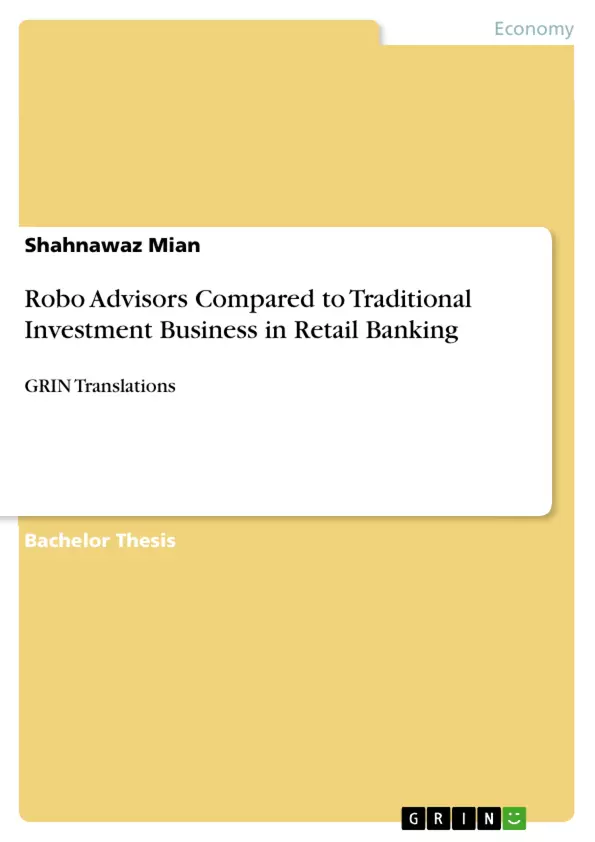This text was translated with the help of AI and reviewed by the GRIN editorial team.
This study examines whether Robo Advisors in Germany have the potential to displace traditional investment business in retail banking. Fintech startups are currently shaping the digital transformation in the banking sector significantly. While banks have lagged in innovation in investment business, fintechs have emerged with digital business models for retail customers' asset management. These so-called Robo Advisors aim to challenge banks' market share in investment business and offer customers a more attractive alternative for their asset management.
Inhaltsverzeichnis (Table of Contents)
- Introduction
- Motivation
- Objectives and approach
- Traditional Investment Business in Retail Banking
- Definition
- Characterization
- Robo Advisors
- Basics
- Types and functionalities
- Market situation in Germany
- Comparison
- Preliminary note
- Customer needs
- Fees and transparency
- Regulatory Supervision
Zielsetzung und Themenschwerpunkte (Objectives and Key Themes)
This study aims to determine whether robo-advisors in Germany possess the potential to supplant traditional investment services within retail banking. The research focuses on comparing the offerings of robo-advisors and traditional investment services in the German retail banking market.
- The rise of FinTechs and their impact on the banking sector.
- The evolution of investment services from traditional banking to digital platforms.
- The comparison of robo-advisor and traditional investment models based on customer needs, fees, transparency, and regulatory compliance.
- The market landscape for robo-advice in Germany and its potential for growth.
- The potential for robo-advisors to challenge traditional investment services in the retail banking sector.
Zusammenfassung der Kapitel (Chapter Summaries)
- The introduction provides background information on the rise of FinTechs and their impact on the banking sector, particularly in the area of investment services. The chapter also outlines the study's objectives and approach.
- This chapter defines and characterizes the traditional investment business in retail banking, outlining the different forms of investment advice and wealth management offered by banks.
- Robo-advisors are introduced in this chapter, with a focus on their basics, types, and functionalities. The chapter also examines the current market situation for robo-advice in Germany.
- This chapter compares the services offered by robo-advisors and traditional investment avenues in retail banking. The comparison analyzes customer needs, fee structures, transparency levels, and regulatory compliance for both models.
Schlüsselwörter (Keywords)
The core concepts of this study include FinTechs, robo-advisors, traditional investment business, retail banking, customer needs, fee structures, transparency, regulatory compliance, and the German market landscape for robo-advice.
- Arbeit zitieren
- Shahnawaz Mian (Autor:in), 2017, Robo Advisors Compared to Traditional Investment Business in Retail Banking, München, GRIN Verlag, https://www.grin.com/document/1467012



